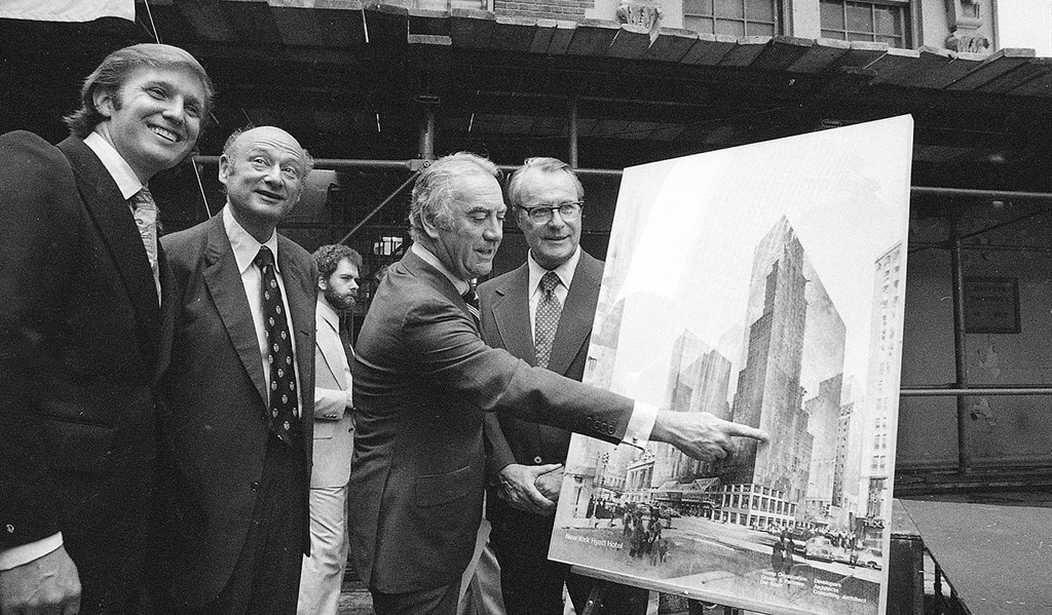Since the 45th president first leapt from the world of business and media into politics, pundits have speculated endlessly about the origin of his populism. To the 21st century reporter and even casual observer, Trump’s aggressive and bombastic tribunesque populism appeared to come out of nowhere. Critics looked quickly at foreign political examples, such as Mussolini or Hitler, conflating the use of personal political charisma with the worst who ever employed it.
But perhaps the real role model came from closer to home.
About the same time that Donald Trump emerged to impose his will on the real estate market in New York City, that city was enjoying a revival of sorts after over a decade of mismanagement and decline. At its helm sat a plucky populist Jewish World War II veteran who remains one of the city’s most popular political figures, Ed Koch.
Koch specialized in the politics of hardball and the theater that makes it so effective. His style prevailed, as he put it, “without the support of the traditional power blocs,” including most of the real estate industry, leaders in county government, or “the liberals and radicals of the New Democratic Coalition.” When in power, he put good policy in front of political support by not deferring to the wishes of Charlie Rangel, refusing to include traditional patronage in the restructuring of poverty programs.
As mayor, Koch attacked the city’s “third rail” issues with gusto. A major political crisis emerged with the city’s decision to close Sydenham Hospital. Located in Harlem, most identified it with the local black community. The decision came after years of budgetary strains and a declining quality of care. Community organizers “occupied” the hospital to draw the mayor into a direct confrontation.
Recommended
In response to accusations of racism in the decision to close the hospital, Koch did not dodge the question. At a town hall meeting, he defended his policies. Koch pointed out that most of the city’s budget in one way or another supported the poor, saying that $4.4 billion overwhelmingly went to provide for “the poorest of the poor,” to “serve people irrespective of their color.” Koch also argued “I speak out for the middle class,” because “they pay the taxes; they provide jobs for the poor people and we’re not able to do as much for them economically as I’d like.”
Koch also thundered that “there are demagogues and ideologues who don’t give a d*** about the middle class.” He also defiantly challenged his opponents, explaining that maybe “they’ll say ‘He’s too controversial and we don’t want him.’ And maybe they’ll throw me out. That’s okay with me. I’ll get a better job, and you won’t get a better mayor.”
Now who does that sound like?
The dirty tricks mustered against Koch and Trump even followed the same pattern. Just as Trump had to face fake accusations of unconventional sexual activity in Moscow, Koch saw similar attacks from his left. Left wingers in the New York Democratic Party, possibly urged on by Mario Cuomo, spread a fear campaign against Koch using prejudices common at the time. They invented police evidence that Koch was secretly living a gay lifestyle. Left wingers in California had also used prejudice against the gay community years earlier, unsuccessfully trying to discredit Ronald Reagan.
During his tenure as mayor, Koch had to face the anger of a Donald Trump in his mid-30s. When Trump was looking to build the famous tower that bears his name, he sought to get a tax exemption that would save him between $30 and $40 million. The Commissioner for Housing Preservation and Development denied his request.
The future president went to the mayor, saying that he was not asking a favor so much as pointing out a “miscarriage of justice.” Koch replied that if he ever overrode a commissioner’s legitimate decision for a powerful person “they should throw me out of office.”
Regardless of the fact that the decision went against Trump, Koch wrote with satisfaction that Trump was one of those “at the very top of my list of campaign contributors when I ran for reelection in 1981.”
The book Mayor: An Autobiography contains numerous such stories about Koch’s bluntness almost to the point of insult, even to President Jimmy Carter over his ambivalent stance toward Israel. Koch, like Trump, knew how to manipulate other pieces on the game board in unpredictable ways, such as cozying up to Ronald Reagan in 1980 even when many thought Carter would win reelection.
Was Donald Trump an exact duplicate of Ed Koch? Of course not. Like many who enter politics, however, it is quite likely that Trump thought back to those figures who impressed him the most. His dedicated support of Koch, even in the face of defeat at his hands, shows Trump’s regard for the mayor at the time, at least as a significant political force.
It may also signal that the example of the still beloved former Democratic mayor of New York City two generations ago inspired the Republican President Donald Trump as he moved from business to politics both in campaigning and governing. Like Trump or not, the evidence suggests an influence.
























Join the conversation as a VIP Member